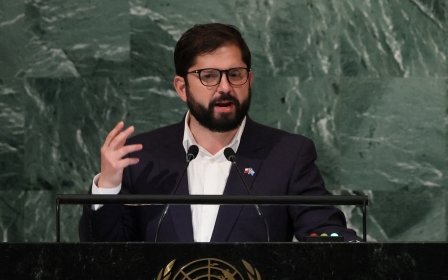Israel bans Palestinian foreign minister from travelling over UN court move

Israel banned the Palestinian foreign minister Riyad Maliki from leaving the occupied West Bank as part of a series of measures announced on Sunday.
Maliki said he was returning from the Brazilian president's inauguration when Israel informed him that his travel permit had been revoked.
Unlike ordinary Palestinians, top Palestinian officials are given special waivers to leave the occupied Palestinian territories.
The Israeli government on Friday approved steps to sanction Palestinians in retaliation for them asking the UN's highest judicial body to give its opinion on the Israeli occupation.
New MEE newsletter: Jerusalem Dispatch
Sign up to get the latest insights and analysis on Israel-Palestine, alongside Turkey Unpacked and other MEE newsletters
The opinions of the Hague-based ICJ, which settles disputes between countries, are binding, but the court has no power to enforce them. Its rulings, however, have a significant influence on international opinion.
Maliki said in a statement following the Israeli actions: "We are studying the legal and political steps to respond to the actions of the Israeli occupation government against our Palestinian people due to the State of Palestine's resort to the International Court of Justice."
"We will call, in a letter to foreign ministries around the world, to take a clear position on these measures so that the occupying power realises that it is not completely free to act as it pleases," added Maliki.
Prime Minister Benjamin Netanyahu told a meeting of his Cabinet on Sunday that the measures against the Palestinians were aimed at what he called "an extreme anti-Israel" step at the UN.
On Friday, the government's Security Cabinet decided Israel would withhold $39m from the Palestinian Authority and transfer the funds instead to a compensation programme for the families of Israeli victims of Palestinian attacks.
Holding Israel accountable
On 31 December, the United Nations General Assembly approved a request for an advisory opinion from the International Court of Justice on Israel's occupation of Palestinian territories.
The 193-member UNGA passed the resolution with 87 votes in favour, 26 against, and 53 abstentions.
At the time, Israeli Prime Minister Benjamin Netanyahu slammed the decision as "despicable".
"The Jewish people are not occupiers in their own land nor occupiers in our eternal capital Jerusalem, and no UN resolution can distort that historical truth," Netanyahu said in a video message.
Palestinian policy experts and academics say that while any ICJ decision critical of Israel would help Palestinians in terms of raising awareness, it would do little to hold Israel accountable and stop its policies against Palestinians, which a number of human rights groups have labelled as apartheid.
Earlier this week, Tariq Kenney-Shawa, a US policy fellow for Al-Shabaka, The Palestinian Policy Network, told Middle East Eye: "A decision by the ICJ would represent a symbolic victory for Palestinians on the international stage, but it is unlikely that it will change much for Palestinians living under Israeli occupation and apartheid."
Middle East Eye delivers independent and unrivalled coverage and analysis of the Middle East, North Africa and beyond. To learn more about republishing this content and the associated fees, please fill out this form. More about MEE can be found here.





